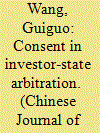|
|
|
Sort Order |
|
|
|
Items / Page
|
|
|
|
|
|
|
| Srl | Item |
| 1 |
ID:
133975


|
|
|
|
|
| Publication |
2014.
|
| Summary/Abstract |
Consent is a precondition of arbitration, regardless of whether it is between private parties to commercial transactions or a foreign investor and its host State. Consent determines the formation and competence of arbitration tribunals. It is therefore a foundation of the investor-State arbitration system. By its very nature, privity is not required in investor-State arbitration, albeit consent is essential to prove that the tribunal in question is bestowed the power to arbitrate. In addition, consent to arbitration may be given by the host State and the foreign investor at different times. It is often the case that the host State will give consent first, which is regarded as a standing offer. The acceptance of this offer by the investor, and thus its own consent, may be accomplished by its filing of a request for arbitration or by direct notification to the respondent State. Due to the variety of treaties coupled with contracts between foreign investors and host States, whether or not a host State has given consent to arbitration and the scope of the consent is often at issue. As far as the form of consent is concerned, most arbitration rules do not stipulate what may constitute a valid consent. For instance, the Convention on the Settlement of Investment Disputes between States and Nationals of Other States ('ICSID Convention') requires consent to arbitration to be in writing. It does not, however, further provide the requirements of writing. In such circumstances, disputing parties have the freedom to choose the manner of expressing their consent. In the circumstances, investment arbitration tribunals are left with much discretion in determining whether consent has been given and its validity as well as its scope. Because of this situation, the decisions of investment arbitration tribunals sometimes trigger criticisms. This article is going to examine the most relevant cases for the purpose of ascertaining the current status of investment law in operation.
|
|
|
|
|
|
|
|
|
|
|
|
|
|
|
|
| 2 |
ID:
139154


|
|
|
|
|
| Summary/Abstract |
An umbrella clause contained in a bilateral investment treaty should be examined from a larger, systemic perspective, instead of a microscopic analysis of whether it enhances the level of protection for foreign investors. In particular, an umbrella clause does not exactly dovetail with some of the basic principles and jurisprudence of public international law. The adoption of an umbrella clause also renders the administration of investment treaties and investment dispute settlement proceedings more complex and difficult to manage. As such, blind adoption and application of an umbrella clause would cause continuing tension and widening rifts in the long run. Viewed from this perspective, the wisdom of having an umbrella clause should be carefully scrutinized from the structural point of view. This realization necessitates the creation of important guidelines for states and investment tribunals concerning the formulation, interpretation and application of an umbrella clause.
|
|
|
|
|
|
|
|
|
|
|
|
|
|
|
|
| 3 |
ID:
133976


|
|
|
|
|
| Publication |
2014.
|
| Summary/Abstract |
Special and differential treatment (S&DT) provisions relate to developing and least developed members of the World Trade Organization (WTO). The effectiveness of S&DT provisions is important because they (1) address asymmetries between members and (2) give the WTO a global character, i.e. it is perceived as catering to the interests of all its members. Have these provisions been effective? Not really. This is mainly because these provisions are non-binding, ambiguous, unstructured and lack connectivity with each other. Developing countries claim they are best endeavour clauses and unrealistic. So how can these provisions be made effective? This article examines the concept of S&DT including its history, reasons behind its introduction and continuation, its merits and demerits, reasons for its success and failure, its jurisprudence, and provides suggestions for improvement.
|
|
|
|
|
|
|
|
|
|
|
|
|
|
|
|
|
|
|
|
|